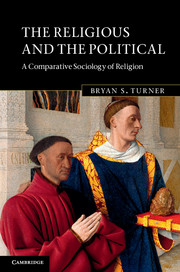Book contents
- Frontmatter
- Contents
- Acknowledgements
- Introduction
- Part I The religious and the political
- Part II State management of religion
- 4 Religion and kingship: liturgies and royal rituals
- 5 Religion and reproduction: marriage and family
- 6 Conversion and the state
- 7 Religion, state and legitimacy: three dimensions of authority
- Part III Comparative and historical studies
- Part IV Conclusion
- References
- Index
4 - Religion and kingship: liturgies and royal rituals
Published online by Cambridge University Press: 05 April 2013
- Frontmatter
- Contents
- Acknowledgements
- Introduction
- Part I The religious and the political
- Part II State management of religion
- 4 Religion and kingship: liturgies and royal rituals
- 5 Religion and reproduction: marriage and family
- 6 Conversion and the state
- 7 Religion, state and legitimacy: three dimensions of authority
- Part III Comparative and historical studies
- Part IV Conclusion
- References
- Index
Summary
Introduction: liturgies
Coronations, and related rituals of monarchy, are public liturgies combining religious and secular elements. Liturgy is from the Greek leos (‘people’), and hence leitourgia is a secular notion referring to the public duties of the citizen. In the public culture of Athens wealthy citizens performed duties at their own expense, such as the choragus who paid for the singers of a chorus at the theatre. It refers therefore to any work of the people directed towards some public duty, and in a religious context it refers to ritual services in a temple. Over time liturgy began to acquire a more precise meaning, for example in the New Testament where it refers to the official services of the Church, corresponding to the public performances in the Temple in the Old Testament.
In the early Church the performance of public rituals such as the Eucharist was not fixed by any exact calendar. In addition, the performance of these rites was not determined by a set of written instructions, but was rather simply delivered by a bishop. While there was no uniformity of practice, thereby allowing local churches to develop their own customs, the basic elements of a liturgy emerged from the performance of the Eucharist in which the bread and the wine were served and the words of the Last Supper were uttered. To some degree these early liturgies simply followed the pattern of worship in the Jewish synagogue, in which passages from the holy books were read, psalms were sung and homilies were read. Over the first two centuries of Christianity these improvisations were standardized as a formal list of basic activities, and the liturgies of West and East also evolved into two distinctive and alternative services. In the West, although there was a uniform liturgy for the whole Church, there remained local variations of the rite corresponding to the patriarchal cities of Antioch, Alexandria, Rome and Gaul. As the liturgical traditions of the West further evolved the Roman rite became dominant, and by 1570 Pius V published his revised Roman Missal that established the official pattern for the whole Church.
- Type
- Chapter
- Information
- The Religious and the PoliticalA Comparative Sociology of Religion, pp. 83 - 100Publisher: Cambridge University PressPrint publication year: 2013



